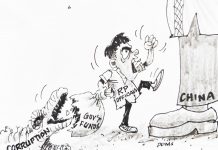The political scenario in the Philippines has sunk to an alarming level of disorder and self-interest. Public service has become secondary to political survival, and governance now bows to the whims of personalities rather than principles. The decay is evident, and it calls for immediate reckoning.
Partisan conflict has taken precedence over national interest. Instead of addressing poverty, education, and health crises, political leaders have been engrossed in feuds and personal vendettas. The current tension between the Marcos and Duterte camps clearly manifests this breakdown in political ethics. What should have been a cooperative effort for governance has turned into a public spectacle of power struggle, with both sides using their influence to malign the other. Such open hostility from two of the most dominant political forces exposes how leadership has been reduced to rivalry rather than responsibility.
This degeneration is worsened by the absence of ideological substance in political parties. Most parties in the country function not as institutions of vision but as vehicles of convenience for candidates seeking office. They shift allegiances at will, disregarding consistency and principle. The frequent political turncoatism in Congress—where lawmakers switch parties depending on who sits in Malacañang—shows the utter lack of conviction among the supposed representatives of the people. In effect, the political system has become a revolving door for opportunists rather than a platform for public service.
Corruption and misuse of public funds further deepen the public’s disillusionment. The controversies surrounding confidential and intelligence funds, particularly the transfer of millions of pesos to certain offices without clear accountability, reveal how public resources are mishandled in plain sight. Likewise, investigations into overpriced government projects and questionable appointments show how political connections often outweigh competence and integrity. These are not isolated lapses but symptoms of a system built on patronage and entitlement. Instead of serving as the machinery of reform, the bureaucracy has been weakened by political interference.
If this nation is to survive with any moral core intact, its citizens must demand a higher standard of leadership. Electoral laws should be reformed to eliminate political dynasties, strengthen party discipline, and punish corruption with certainty. Civil institutions must assert their independence and resist political intimidation. Above all, voters must reject personalities that treat politics as a family inheritance or a business venture. With genuine accountability and political education, the country can rise again from the moral collapse that now defines its governance.




